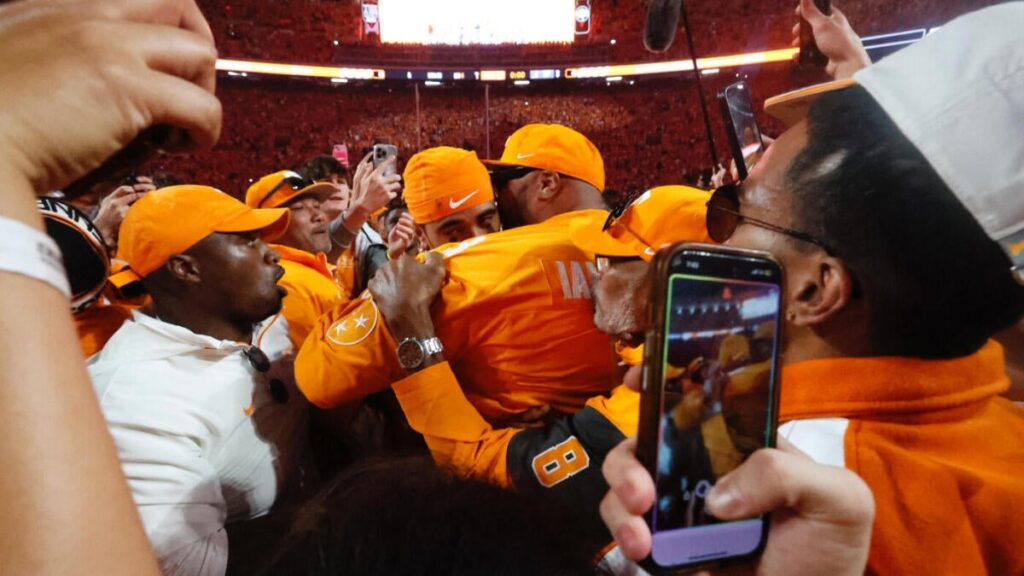There’s a simple way to describe the complicated current state of affairs in college athlete compensation, most recently highlighted by the Nico Iamaleava saga that led to him leaving Tennessee over a gone-public NIL renegotiation days before the spring transfer portal window opens.
In conversations about the fallout, people are quick to bemoan the “professionalization” of college athletics ostensibly moving toward an NFL model, but in the words of a talent representative in a different part of the entertainment industry, “it’s the death of amateurism but it sure as hell isn’t professional.”
College athletics has progressed from what came before it when even as much as a steak dinner paid for by a booster was treated like a high crime and misdemeanor in the kangaroo court disguised as NCAA governance, but the only thing that seems professional about the enterprise is that players are getting paid in the first place.
Nobody is blameless here in the fallout. Part of growing up is the freedom of choice, but so many believe that comes with the freedom from consequences.
Iamaleava is not a child; he is a somewhat professional athlete who has been compensated handsomely to play college football. He has agency here, and he messed around and found out. It’s unfortunate, but that is the cost of overplaying leverage and it’s an unfortunate business reality we all hope to avoid. The truth is that the business world is full of good actors and bad actors, but it’s also filled with inept ones.
It is unfair to expect a young adult to navigate a situation like this smoothly, which is why more blame must certainly be shouldered by the people in his ear. He obviously got bad advice from those around him, including his father, Nicholaus — whose only public comment to date is calling the reporter who accurately broke the story a “bi7ch” on social media.
Tennessee isn’t blameless, either. The Vols are being applauded in college football personnel circles for standing up to a shakedown attempt, but if Tennessee wants to complain about the Wild West, it is partially the reason it’s so wild in the first place. It was Tennessee’s Attorney General (among others) who sued the NCAA in 2024 to prevent the organization from investigating potential infractions by Tennessee in its initial recruitment of Iamaleava. The organization’s response was to stop investigating all third-party participation in NIL-related activity. If the emperor has no clothes, it is Tennessee which directly contributed to the lack of fabric.
Tennessee moving on from Nico Iamaleava strikes a blow against never-ending NIL negotiations
Chris Hummer
The NCAA is not blameless, either, and at the heart of all of this for decades upon decades in support of the veil of amateurism definition that they hid behind until they legally could no longer do so. Whether they would investigate and adjudicate this player compensation era effectively is another debate, but it is a fact that they were prevented from doing so.
The NFL has had a collective bargaining agreement since 1968. In college sports, they are building the plane as they fly it. Player
“contracts” are a mess. There are no formal players associations to negotiate basic parameters on behalf of athletes, such as boilerplate contract structure even or common sense rules like when a player can renegotiate with their current school, or how often they can do so, or if it’s even permissible to attempt to negotiate with other schools while you’re still at your original school. There is no salary transparency, leading to word of mouth inflation driving the price for players. There’s even less verification of agent credentials.
That’s just a sampling of what’s missing here. It all amounts to a system that features paperwork-linking parties, but is functionally treated as a perpetual negotiation.
All of this means there will be more Nico Iameleavas. There will be more Jaden Rashadas. There will be more Matthew Slukas. The particulars may be different, but the common thread is clear: unprofessionalism. This is not a market; it’s a patchwork of agreements that aren’t held together by much more than duct tape and spittle. There’s hope that the upcoming House settlement’s approval will help this, but the straight line to professionalization many envision it provides will take many twists and turns as well.
Change is frustratingly incremental and progress is not linear. College sports isn’t professional. At this rate it’s hard to see when it ever really will be.
Read the full article here



